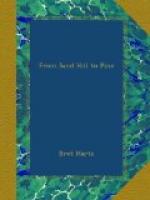He was further lightening the journey by cheering accounts of the recent depredations of bears and panthers in that immediate locality. When overtaken by Fleming he affected a start of joyful surprise, to conceal the look of warning which Fleming did not heed,—having no eyes but for Faulkners companion. She was a very fat negro woman, panting with exertion and suppressed impatience. Fleming’s heart was filled with compunction.
“Is you Marse Fleming?” she gasped.
“Yes,” said Fleming gently. “What can I do for you?”
“Well! Ye kin pick dis yar insek, dis caterpillier,” she said, pointing to Faulkner, “off my paf. Ye kin tell dis yar chipmunk dat when he comes to showin’ me mule tracks for b’ar tracks, he’s barkin’ up de wrong tree! Dat when he tells me dat he sees panfers a-promenadin’ round in de short grass or hidin’ behime rocks in de open, he hain’t talkin’ to no nigger chile, but a growed woman! Ye kin tell him dat Mammy Curtis lived in de woods afo’ he was born, and hez seen more b’ars and mountain lyuns dan he hez hairs in his mustarches.”
The word “Mammy” brought a flash of recollection to Fleming.
“I am very sorry,” he began; but to his surprise the negro woman burst into a good-tempered laugh.
“All right, honey! S’long’s you is Marse Fleming and de man dat took dat ‘ar pan offer Tinka de odder day, I ain’t mindin’ yo’ frens’ bedevilments. I’ve got somefin fo’ you, yar, and a little box,” and she handed him a folded paper.
Fleming felt himself reddening, he knew not why, at which Faulkner discreetly but ostentatiously withdrew, conveying to his other partner painful conviction that Fleming had borrowed a pan from a traveling tinker, whose negro wife was even now presenting a bill for the same, and demanding a settlement. Relieved by his departure, Fleming hurriedly tore open the folded paper. It was a letter written upon a leaf torn out of an old account book, whose ruled lines had undoubtedly given his partners the idea that it was a bill. Fleming hurriedly read the following, traced with a pencil in a schoolgirl’s hand:—
Mr. J. Fleming.
Dear Sir,—After you went away that day I took that pan you brought back to mix a batch of bread and biscuits. The next morning at breakfast dad says: “What’s gone o’ them thar biscuits—my teeth is just broke with them—they’re so gritty—they’re abominable! What’s this?” says he, and with that he chucks over to me two or three flakes of gold that was in them. You see what had happened, Mr. Fleming, was this! You had better luck than you was knowing of! It was this way! Some of the gold you washed had got slipped into the sides of the pan where it was broke, and the sticky dough must have brought it out, and I kneaded them up unbeknowing. Of course I had to tell a wicked lie, but “Be ye all things to all men,” says the Book, and I thought you ought to know your good luck, and I send mammy with this and the gold in a little box. Of course, if dad was a hunter of Mammon and not of God’s own beasts, he would have been mighty keen about finding where it came from, but he allows it was in the water in our near spring. So good-by. Do you care for your ring now as much as you did?




